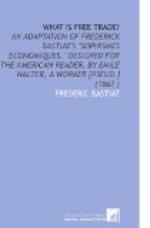How much we should prefer to say simply how things are, without occupying ourselves with the thousand aspects in which the ignorant see them! To explain the laws under which societies prosper or decay, is virtually to destroy all sophistry at once. When La Place had described all that can, as yet, be known of the movements of the heavenly bodies, he had dispersed, without even naming them, all the astrological dreams of the Egyptians, Greeks, and Hindoos, much more surely than he could have done by directly refuting them through innumerable volumes. Truth is one; the book which exposes it is an imposing and durable monument:
Il brave les tyrans
avides,
Plus hardi que les Pyramides
Et plus durable que
l’airain.
Error is manifold, and of ephemeral duration; the work which combats it does not carry within itself a principle of greatness or of endurance.
But if the power, and perhaps the opportunity, have failed us for proceeding in the manner of La Place and of Say, we cannot refuse to believe that the form which we have adopted has, also, its modest utility. It appears to us especially well suited to the wants of the age, to the hurried moments which it can consecrate to study.
A treatise has, doubtless, an incontestable superiority; but upon condition that it be read, meditated upon, searched into. It addresses itself to a select public only. Its mission is, at first, to fix, and afterwards to enlarge, the circle of acquired knowledge.
The refutation of vulgar prejudices could not carry with it this high bearing. It aspires only to disencumber the route before the march of truth, to prepare the mind, to reform public opinion, to blunt dangerous tools in improper hands. It is in social economy above all, that these hand-to-hand struggles, these constantly recurring combats with popular errors, have a true practical utility.
We might arrange the sciences under two classes. The one, strictly, can be known to philosophers only. They are those whose application demands a special occupation. The public profit by their labor, despite their ignorance of them. They do not enjoy the use of a watch the less, because they do not understand mechanics and astronomy. They are not the less carried along by the locomotive and the steamboat through their faith in the engineer and the pilot. We walk according to the laws of equilibrium without being acquainted with them.
But there are sciences which exercise upon the public an influence proportionate with the light of the public itself, not from knowledge accumulated in a few exceptional heads, but from that which is diffused through the general understanding. Such are morals, hygiene, social economy, and in countries which men belong to themselves, politics. It is of these sciences, above all, that Bentham might have said: “That which spreads them is worth more than that which advances them.” Of what consequence is it that a great man, a God even, should have promulgated moral laws, so long as men, imbued with false notions, take virtues for vices, and vices for virtues? Of what value is it that Smith, Say, and, according to Chamans, economists of all schools, have proclaimed the superiority of liberty to restraint in commercial transactions, if those who make the laws and those for whom the laws are made, are convinced to the contrary.




